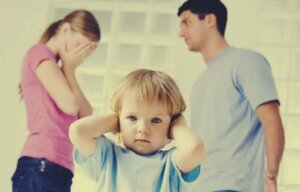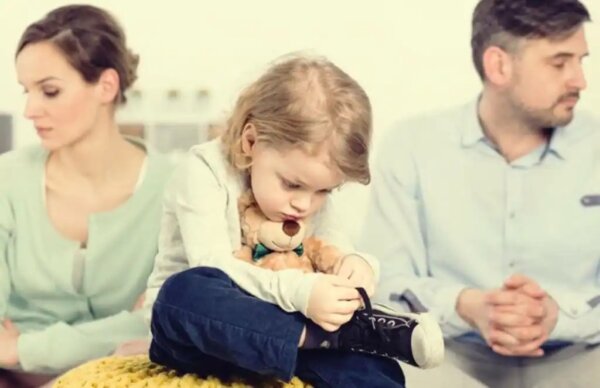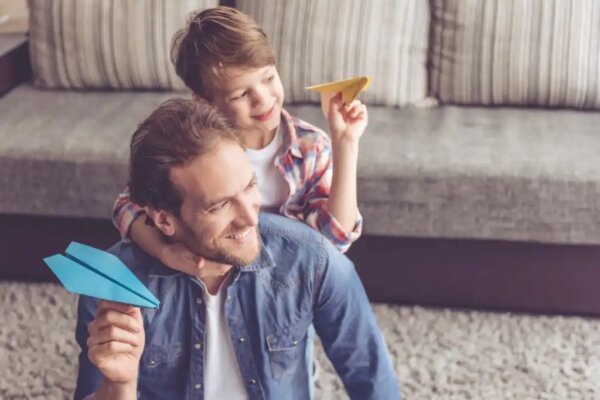Staying Together for the Children is a Mistake


Written and verified by the psychologist Valeria Sabater
There are many couples who stay together for the sake of their children. This is because they have the old-fashioned idea that good parents are those who are always present in their children’s lives. These kinds of people frequently live in an environment of bitterness and frustration. Nevertheless, they simply don’t consider the fact that their endless bickering means their little ones are witnesses to a constant battle.
These types of people think that it’s always better for children to grow up with both parents in the same household, whatever the circumstances may be. In fact, they believe they’re putting their children first. However, for children, simply being around two people who no longer love each other has a serious effect on their brains.
Many experts have spoken out about this situation. They confirm that aggressive behavior and negative emotions directly shape children. As a matter of fact, it’s highly likely that they’ll eventually integrate these bad skills into their own affective relationships and parenting styles.
Some children are left neglected in a home where their parents are more focused on their own problems and disagreements with their partners.

Why isn’t staying together for the children the right thing to do?
When love and affection disappear in a relationship, they’re rarely rekindled. For this reason, the most logical thing to do in these situations is to split up. Everyone would surely agree with this. Well, everyone, that is except the couples who choose to put up with it for a bit longer for the children’s sake.
Naturally, any separation or divorce affects children. Indeed, for a while, they’ll inevitably suffer due to a change in their circumstances and having to split their time between both parents. Nevertheless, while this may appear to be extremely detrimental, there are other even more harmful psychological aspects to a child than separation.
For example, some parents may exhibit extreme forms of behavior when maintaining the pretense of a relationship where there’s no love left. For instance, being under the same roof as a partner they no longer want, often contributes to instances of infidelity. Furthermore, in the most extreme cases, there’ll be swearing and shouting, and even psychological abuse. All of this has serious consequences.
Effects on the children
Couples aren’t always aware of the effects their actions have on their little ones. Although the phenomenology associated with these situations is diverse, we can assume the following:
- Inattention. Sometimes parents are so wrapped up in their own arguments, they might neglect their children.
- Educational contradictions. When there’s no harmony between a couple, they often issue contradictory demands to their children.
- As the partnership disintegrates and becomes even more difficult, it’s likely that feelings of anxiety and despair will appear. In addition, unhappy parents are unable to carry out their parenting and educational duties in the correct manner.
- Projection of guilt onto the children. If parents feel unhappy about staying in the same household for the children’s sake, they may later see the children as being responsible for their own unhappiness. Consequently, they make the children feel guilty.
A family atmosphere defined by recriminations, arguments, shouting, a lack of affection, and even contempt, affects a child’s brain. In fact, growing up in an unhappy environment always has consequences.
Living separately costs, but is best for the children
Times change. In our grandparents’, or even our parents’ generation, it was common to put up with the unspeakable in a relationship before breaking up. However, nowadays, break-ups, separations, and divorces are far more common. Despite this fact, there are still couples staying together for the children.
Scientific literature is very clear on this subject. The Universities of Los Angeles, Chicago, and Princeton conducted some studies. They stated that any social discourse which promotes relational stability at any cost, for the psychological well-being of a child is wrong. With this in mind, there’s no doubt that growing up in a home where parents don’t love each other is detrimental.
The most important element in all cases is to help children adjust to these changes in their lives. Naturally, every separation is painful. However, each individual situation is unique. Nevertheless, what they all share is the need for parents to show their children or adolescents how to properly manage their emotions, attitudes, and thoughts.
Growing up in a home where parents love each other is always the most desirable option for children. However, research proves that, when divorce is handled well, it can be the healthiest option for children.

How to help children deal with a break-up
Parents must understand that, while divorce and separation are inevitably painful and difficult for them, they mustn’t neglect their children. For this reason:
- The children must feel safe and loved at all times.
- Parents should tell them the truth.
- One parent shouldn’t try and turn the children against the other one.
- They should encourage children to talk. Furthermore, to answer their questions and help them deal with their emotions.
- They should ensure that the children have clearly set out routines.
Finally, despite the harshness and complexity of these situations, if they’re handled well, both parents and children will be able to find stability. For this reason, parents must always commit themselves to the well-being of their little ones.
There are many couples who stay together for the sake of their children. This is because they have the old-fashioned idea that good parents are those who are always present in their children’s lives. These kinds of people frequently live in an environment of bitterness and frustration. Nevertheless, they simply don’t consider the fact that their endless bickering means their little ones are witnesses to a constant battle.
These types of people think that it’s always better for children to grow up with both parents in the same household, whatever the circumstances may be. In fact, they believe they’re putting their children first. However, for children, simply being around two people who no longer love each other has a serious effect on their brains.
Many experts have spoken out about this situation. They confirm that aggressive behavior and negative emotions directly shape children. As a matter of fact, it’s highly likely that they’ll eventually integrate these bad skills into their own affective relationships and parenting styles.
Some children are left neglected in a home where their parents are more focused on their own problems and disagreements with their partners.

Why isn’t staying together for the children the right thing to do?
When love and affection disappear in a relationship, they’re rarely rekindled. For this reason, the most logical thing to do in these situations is to split up. Everyone would surely agree with this. Well, everyone, that is except the couples who choose to put up with it for a bit longer for the children’s sake.
Naturally, any separation or divorce affects children. Indeed, for a while, they’ll inevitably suffer due to a change in their circumstances and having to split their time between both parents. Nevertheless, while this may appear to be extremely detrimental, there are other even more harmful psychological aspects to a child than separation.
For example, some parents may exhibit extreme forms of behavior when maintaining the pretense of a relationship where there’s no love left. For instance, being under the same roof as a partner they no longer want, often contributes to instances of infidelity. Furthermore, in the most extreme cases, there’ll be swearing and shouting, and even psychological abuse. All of this has serious consequences.
Effects on the children
Couples aren’t always aware of the effects their actions have on their little ones. Although the phenomenology associated with these situations is diverse, we can assume the following:
- Inattention. Sometimes parents are so wrapped up in their own arguments, they might neglect their children.
- Educational contradictions. When there’s no harmony between a couple, they often issue contradictory demands to their children.
- As the partnership disintegrates and becomes even more difficult, it’s likely that feelings of anxiety and despair will appear. In addition, unhappy parents are unable to carry out their parenting and educational duties in the correct manner.
- Projection of guilt onto the children. If parents feel unhappy about staying in the same household for the children’s sake, they may later see the children as being responsible for their own unhappiness. Consequently, they make the children feel guilty.
A family atmosphere defined by recriminations, arguments, shouting, a lack of affection, and even contempt, affects a child’s brain. In fact, growing up in an unhappy environment always has consequences.
Living separately costs, but is best for the children
Times change. In our grandparents’, or even our parents’ generation, it was common to put up with the unspeakable in a relationship before breaking up. However, nowadays, break-ups, separations, and divorces are far more common. Despite this fact, there are still couples staying together for the children.
Scientific literature is very clear on this subject. The Universities of Los Angeles, Chicago, and Princeton conducted some studies. They stated that any social discourse which promotes relational stability at any cost, for the psychological well-being of a child is wrong. With this in mind, there’s no doubt that growing up in a home where parents don’t love each other is detrimental.
The most important element in all cases is to help children adjust to these changes in their lives. Naturally, every separation is painful. However, each individual situation is unique. Nevertheless, what they all share is the need for parents to show their children or adolescents how to properly manage their emotions, attitudes, and thoughts.
Growing up in a home where parents love each other is always the most desirable option for children. However, research proves that, when divorce is handled well, it can be the healthiest option for children.

How to help children deal with a break-up
Parents must understand that, while divorce and separation are inevitably painful and difficult for them, they mustn’t neglect their children. For this reason:
- The children must feel safe and loved at all times.
- Parents should tell them the truth.
- One parent shouldn’t try and turn the children against the other one.
- They should encourage children to talk. Furthermore, to answer their questions and help them deal with their emotions.
- They should ensure that the children have clearly set out routines.
Finally, despite the harshness and complexity of these situations, if they’re handled well, both parents and children will be able to find stability. For this reason, parents must always commit themselves to the well-being of their little ones.
All cited sources were thoroughly reviewed by our team to ensure their quality, reliability, currency, and validity. The bibliography of this article was considered reliable and of academic or scientific accuracy.
- Anderson J. (2014). The impact of family structure on the health of children: Effects of divorce. The Linacre quarterly, 81(4), 378–387. https://doi.org/10.1179/0024363914Z.00000000087
- Brand, JE, Moore, R., Song, X. y Xie, Y. (2019). El divorcio de los padres no es uniformemente perjudicial para el logro educativo de los niños. Actas de la Academia Nacional de Ciencias de los Estados Unidos de América , 116 (15), 7266–7271. https://doi.org/10.1073/pnas.1813049116
This text is provided for informational purposes only and does not replace consultation with a professional. If in doubt, consult your specialist.







